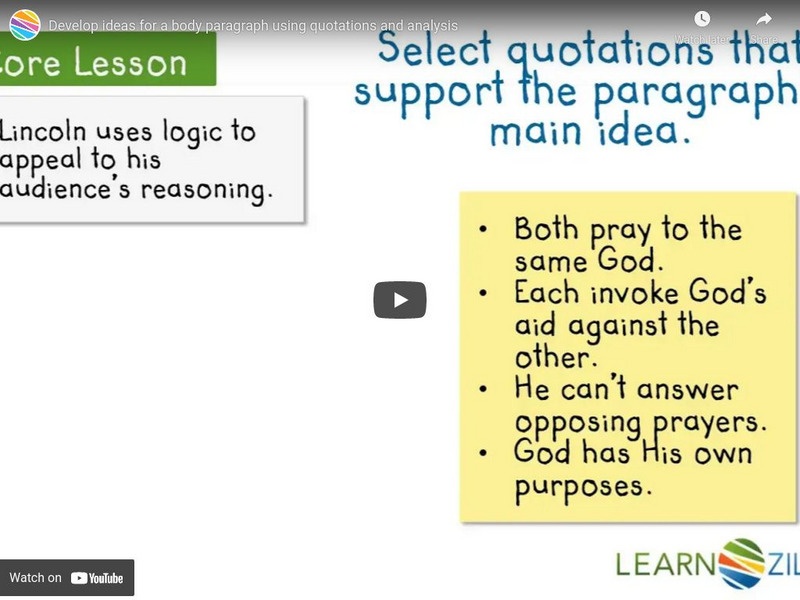Hi, what do you want to do?
TED-Ed
How Did Dracula Become the World's Most Famous Vampire?
What has copyright law have to do with the Dracula, the most famous vampire in history? Check out the twisted tale of how a fight over the royalty rights to Bram Stoker's novel gave immortality to the blood sucker.
Macat
An Introduction to Simone de Beauvoir's The Second Sex
Simone de Beauvoir is considered one of the first feminist philosophers and her book, The Second Sex, is known as one of the most important treatises on feminism. Introduce young philosophers to Beauvoir's ideas with a short video...
EnglishClass101.com
May Day Explained
What is May Day? Why and when do we celebrate it? Find out with an informational video that details the holiday's background and today's celebratory traditions.
TED-Ed
Why Do We Hiccup?
There are so many remedies for curing the hiccups, from eating honey, to being scared, to breathing into a bag. But what makes the diaphragm contract the way it does? Watch an informative video to find out what causes...
TED-Ed
How Do Schools of Fish Swim in Harmony?
How does the way our brains work relate to the way fish swim in harmony? An engaging video explains how emergence is the answer to both.
TED-Ed
The Surprising Reason You Feel Awful When You're Sick
You know that feeling you get when the flu comes along? Achy muscles, sore throat, and fever are just a few of the body's responses to a virus or infection. Watch the video to discover what is really happening to make your body feel the...
TED-Ed
How I Responded to Sexism in Gaming with Empathy
Listen as Lilian Chen describes her experiences with sexism in the Super Smash Brothers gaming community, and explores topics like bullying, gender imbalance, social dynamics, and feminism.
TED-Ed
Can Robots Be Creative?
What is creativity, anyway? Check out this fascinating video on the potential for creativity from artificial intelligence. The resource provides insight into the world of computer programming and algorithms, while at the same...
University of Florida
Understanding Car Crashes: It's Basic Physics!
Make an impact on young physicists with this fun collection of resources. After first watching a video and taking notes on the physics of car crashes, students go on to complete a series of activities that explore the...
pelinks4u
Volleyball
Before coaching or beginning your next PE unit on volleyball, take a look at this 30-lesson unit that offers instructional techniques for each lesson, as well as warm-up activities, set inductions, and suggested coaching refinements.
TED-Ed
A Brief History of Melancholy
What is sadness? How is it part of the human experience, and does it have any value? Explore how the concept of sadness has evolved throughout history and across cultures, and discuss its ties to philosophy and implications for...
TED-Ed
Is Math Discovered or Invented?
Did mankind invent mathematical concepts, or is math the native language of the universe itself? Discover the beliefs of famous philosophers such as Plato and Euclid with regard to the place of numbers in nature, and take a brief look at...
TED-Ed
Why We Love Repetition in Music
Why does music rely so heavily on repetition? This is an interesting video from which to explore not only the psychological answers to this question, but also the ways in which humans perceive and rate different types of music.
TED-Ed
How Quantum Mechanics Explains Global Warming
What do quantum mechanics and global warming have to do with each other? More than you might think. Surprisingly, this video explains how it's not the energy emitted from the sun that causes the problem, but how the infrared radiation...
Appalachian State University
Glory: Motion Picture Study Guide
This is an excellent resource for teachers to use for incorporating the motion picture Glory into the classroom! Breaking down the film into particular noteworthy and telling scenes, the guide offers important considerations for...
The New York Times
Kiev in Chaos: Teaching About the Crisis in Ukraine
Provide a historical context for the political unrest between Russia and Ukraine that began in late 2013. Learners review their prior knowledge and chronicle new understandings with a KWL chart, watch a video explaining the Ukrainian...
Sophia Learning
Sophia: Argumentative Papers
This video lesson focuses on argumentative papers; it begins by defining argument and an argumentative paper including its purpose. It then discusses what is included in an argumentative paper: a thesis statement showing topic and...
Sophia Learning
Sophia: Argumentative Papers: Topics and Thesis
This lesson focuses on selecting a topic and writing a thesis for an argumentative paper. It explains the purpose of argumentative writing, lists the aspects of a strong topic, suggests ways to find a topic, discusses the purpose and...
Imagine Learning Classroom
Learn Zillion: Develop Ideas for a Body Paragraph Using Quotations and Analysis
In this video, you will learn how to develop relevant ideas for a body paragraph by selecting quotations and generating analysis. [8:15]
Imagine Learning Classroom
Learn Zillion: Video: Draft a Body Paragraph by Choosing Relevant Evidence
In this lesson, you will learn how to develop a body paragraph by choosing relevant and sufficient quotations and analysis. [7:33]
PBS
Pbs: Workplace Essential Skills: Respecting Your Team Members
Employees describe the importance of treating coworkers with respect and working well with people of diverse backgrounds and ages.
PBS
Pbs: Workplace Essential Skills: Conflict Resolution
A manager and an employee explain the importance of communication and seeing issues from another person's perspective in order to quickly and effectively resolve conflicts in the workplace.
Sophia Learning
Sophia: Research Methods: Lesson 9
This lesson will explore research methods, delineate the steps of the scientific method. It will also discuss experiments, survey research, focus groups, participant observation and using secondary sources for analysis. It is 9 of 9 in...


























